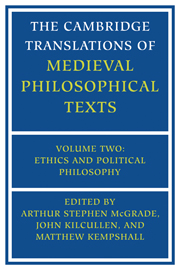Book contents
- Frontmatter
- Contents
- Preface
- General Introduction
- 1 ALBERT THE GREAT: Questions on Book X of the Ethics
- 2 BONAVENTURE: Conscience and Synderesis
- 3 GILES OF ROME: On the Rule of Princes (selections)
- 4 PETER OF AUVERGNE: Commentary and Questions on Book III of Aristotle's Politics (selections)
- 5 HENRY OF GHENT: Is It Rational for Someone without Hope of a Future Life to Choose to Die for the Commonwealth?
- 6 GODFREY OF FONTAINES: Does a Human Being Following the Dictates of Natural Reason Have to Judge that He Ought to Love God More than Himself?
- 7 JAMES OF VITERBO: Does a Human Being Have a Greater Natural Love for God than for Himself, or Vice Versa?
- 8 GODFREY OF FONTAINES: Reply to James of Viterbo on Love of God and Self
- 9 HENRY OF GHENT: Is a Subject Bound to Obey a Statute When It Is Not Evident that It Promotes the Common Utility?
- 10 GODFREY OF FONTAINES: Are Subjects Bound to Pay a Tax When the Need for It Is Not Evident?
- 11 JAMES OF VITERBO: Is It Better to Be Ruled by the Best Man than by the Best Laws?
- 12 JOHN OF NAPLES: Should a Christian King Use Unbelievers to Defend His Kingdom?
- 13 WILLIAM OF OCKHAM: Using and Enjoying
- 14 AUGUSTINE OF ANCONA: Summa on Ecclesiastical Power (selections)
- 15 WILLIAM OF OCKHAM: Is an Errant Individual Bound to Recant at the Rebuke of a Superior?
- 16 JEAN BURIDAN: Questions on Book X of the Ethics
- 17 JOHN WYCLIF: On Civil Lordship (selections)
- Index
1 - ALBERT THE GREAT: Questions on Book X of the Ethics
Published online by Cambridge University Press: 05 June 2012
- Frontmatter
- Contents
- Preface
- General Introduction
- 1 ALBERT THE GREAT: Questions on Book X of the Ethics
- 2 BONAVENTURE: Conscience and Synderesis
- 3 GILES OF ROME: On the Rule of Princes (selections)
- 4 PETER OF AUVERGNE: Commentary and Questions on Book III of Aristotle's Politics (selections)
- 5 HENRY OF GHENT: Is It Rational for Someone without Hope of a Future Life to Choose to Die for the Commonwealth?
- 6 GODFREY OF FONTAINES: Does a Human Being Following the Dictates of Natural Reason Have to Judge that He Ought to Love God More than Himself?
- 7 JAMES OF VITERBO: Does a Human Being Have a Greater Natural Love for God than for Himself, or Vice Versa?
- 8 GODFREY OF FONTAINES: Reply to James of Viterbo on Love of God and Self
- 9 HENRY OF GHENT: Is a Subject Bound to Obey a Statute When It Is Not Evident that It Promotes the Common Utility?
- 10 GODFREY OF FONTAINES: Are Subjects Bound to Pay a Tax When the Need for It Is Not Evident?
- 11 JAMES OF VITERBO: Is It Better to Be Ruled by the Best Man than by the Best Laws?
- 12 JOHN OF NAPLES: Should a Christian King Use Unbelievers to Defend His Kingdom?
- 13 WILLIAM OF OCKHAM: Using and Enjoying
- 14 AUGUSTINE OF ANCONA: Summa on Ecclesiastical Power (selections)
- 15 WILLIAM OF OCKHAM: Is an Errant Individual Bound to Recant at the Rebuke of a Superior?
- 16 JEAN BURIDAN: Questions on Book X of the Ethics
- 17 JOHN WYCLIF: On Civil Lordship (selections)
- Index
Summary
Introduction
Albert the Great (referred to as such from the fourteenth century) was born near Ulm about the year 1200. His first university studies were at Padua, where he joined the Dominican Order around 1220/3. He returned to Germany to study theology and in 1245 became the first German master at the University of Paris. Thomas Aquinas, one of Albert's pupils at Paris, followed him to Cologne, where Albert founded a Dominican house of studies and taught from 1248 to 1252. The following selection, which dates from this period, is taken from the first of Albert's two commentaries on the Nicomachean Ethics. There is a tradition that Aquinas was assigned to write down these lectures. Albert was the Dominican Provincial in Germany from 1254 to 1257 and at papal insistence was elected bishop of Regensburg in 1260, but he was allowed to return to teaching at Cologne in 1262. In 1277 he went to Paris in a vain attempt to prevent the condemnation by Bishop Stephen Tempier of 219 propositions in philosophy and theology, many of which were commonly associated with his and Aquinas's teachings. He died at Cologne in 1280.
Albert was the first interpreter in the Latin west of Aristotle's work in its entirety. He distinguished sharply between philosophy and theology, insisting that philosophical problems be solved philosophically and denouncing the enemies of philosophy as ‘brute beasts’ who ‘blaspheme against what they do not know.’
- Type
- Chapter
- Information
- The Cambridge Translations of Medieval Philosophical Texts , pp. 12 - 168Publisher: Cambridge University PressPrint publication year: 2000



